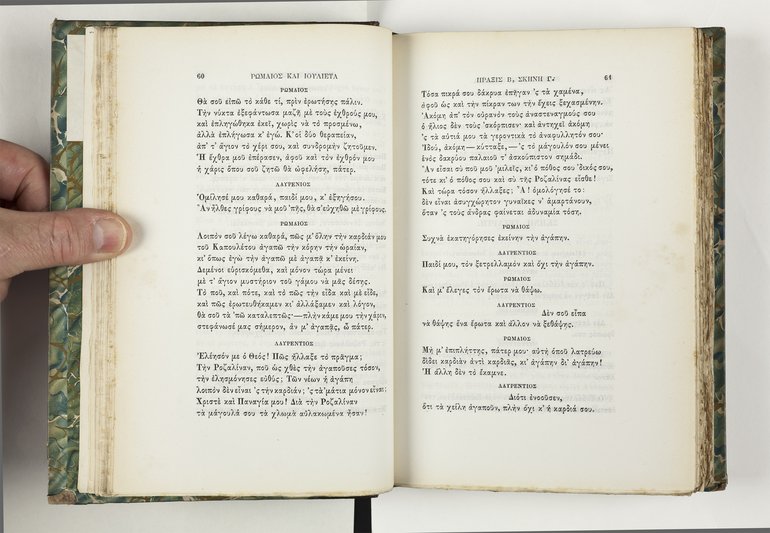Dimitrios Vikelas's Greek translation constitutes an important episode in the history of modern Greek literature. Published in Athens in 1876 under the title Tragodiai Saikspeirou (‘Shakespeare's Tragedies’), Vikelas’s translation was not the first Greek translations of Shakespeare's works. However, his translation proved to be very popular and influential, bringing Shakespeare to a new readership in Greece and affecting the development of Greek theatre in the 1880s and the poetic style in Greek literature.
Dimitrios Vikelas (1835-1908) is best known as the first president of the International Olympic Committee and author of Loukis Laras (Athens, 1879), the most translated nineteenth-century Greek novel. He worked as a merchant in London for twenty-four years and then spent fifteen years in Paris before returning to Greece. An independent scholar and intellectual, Vikelas published a variety of historical and literary works as poet and writer. As translator he published nine of Hans Christian Andersen’s fairy tales in 1871, as well as six Shakespeare plays: Romeo and Juliet, Othello and King Lear in 1876, Macbeth and Hamlet in 1882, and The Merchant of Venice in 1884.
The copy of Tragodiai Saikspeirou housed in the Shakespeare Birthplace Trust Library (SBTL) contains Vikelas’s translations of Romeo and Juliet, Othello and King Lear in one volume. The book is an octavo hardcover in good condition, with the spine intact and no marks on the pages. The translation is accompanied by a fifteen-page prologue and an extensive commentary with references to contemporary scholarly studies on Shakespeare, such as Georg Gottfried Gervinus’s Shakespeare Commentaries (first English translation 1863).

The importance of the SBTL copy lies in the fact that it contains a handwritten dedication on the opening page and a short letter by Vikelas. The dedication reads: ‘F. J. Furnivall, from D. Vikelas, 5 Sept 1876’. Frederick James Furnivall was a philologist, founder of The New Shakespeare Society and co-founder of the New English Dictionary. Vikelas’s letter was also written on the 5th September and bears the address ‘South Sea House, Threadneedle St, London’. South Sea House, home of the Baltic Exchange from 1866, housed mercantile offices in the year the letter was written. In the letter Vikelas conveys his enjoyment reading Furnivall’s publications on Shakespeare (whom he calls ‘our poet’), and offers him the said copy of Tragodiai Saikspeirou as an expression of gratitude.

As such, this letter raises interesting questions about the literary circle of Vikelas, the possible sources available to him while undertaking his translation work, and further highlights the topic of translation as appropriation in the nineteenth century, at a time when Romanticism transformed Shakespeare into a worldwide phenomenon.
